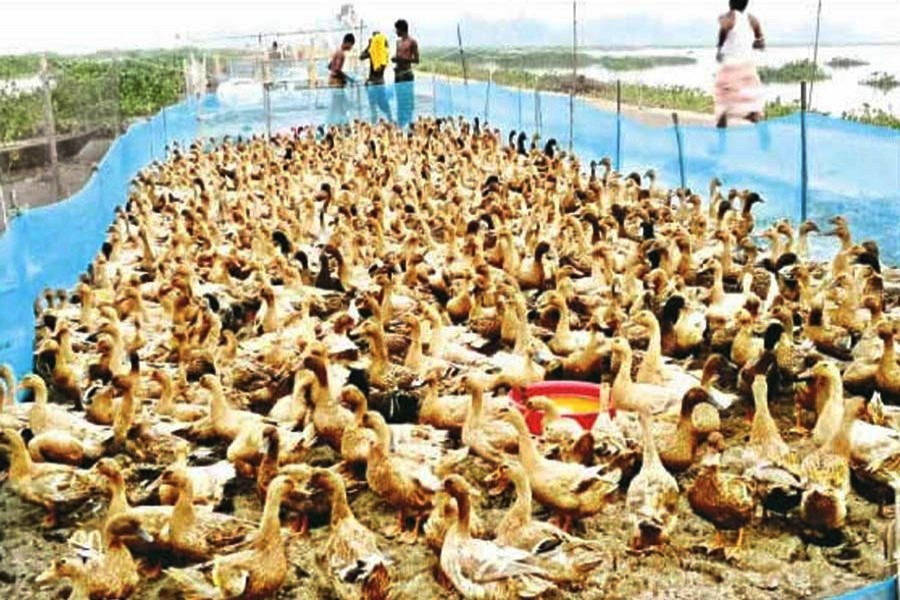RAJSHAHI: Thousands of poor and grassroots families living in villages adjacent to various water bodies of the district have attained financial solvency by rearing ducks.
Sources said more than 3,000 families of 31 villages of Godagari, Tanore, Bagmara, Mohanpur and Durgapur upazilas of the district are engaged in rearing ducks at their home-based farms.
Each of the duck firm holds 20 to 200 ducks in the area.
Housewives of remote villages of Char Asariadaha, Decreer char, Diar Manik Char, Mohishalbari, Palpur, Harin bishka, Faradpur, Bijoy Nagar, Samsadipur and Bidirpur under Godagari upazila, Tilna, Talanda, Beel Kalam, Badhoir, Saranjai and Chanduria of Tanore upazila, Sadhupara, Mohanganj, Hatmadhnagar and Goalkandi Beel villages of Bagmara upazila and villages situated adjacent of water bodies of Mohanpur and Durgapur upazilas are rearing ducks as an alternative source of income.
Early in the morning, village women take their flock of ducks to the water bodies near their houses and bring their ducks back home in the afternoon.
Sakina (40) of Palpur village, Ashia (35) of Faradpur village and Shaida (27) of Bijoynagar village said in the past their only profession was to catch fish, dry and sell those in the markets or to keep themselves engaged in household chores.
Poverty was their perennial companion. Moreover, the families who depended on fishing became helpless over the last few decades due to poor navigability in the Padma and other rivers in the district.
Many of those poor fishermen families and poor people used to live on other professions, took loan from NGOs and started duck farming at their houses.
The Department of Livestock also came forward to assist them by supplying them with improved, hybrid variety of ducklings. Those hybrid ducks got immense popularity among people for their speedy growth and laying of large number of eggs. Within five years, the number of duck rearers increased at the villages of the said upazilas.
Sakhina rears 120 ducks at her farm from which she gets 50 eggs daily. The cost of rearing ducks is also almost negligible. The ducks visited various canals, ponds and water bodies of the villages and eat snail, insects and herbs. But, during dry season, extra food is needed for the ducks.
The duck farm owners then kept their ducks inside the pen because paddy and other crops are grown during the dry season at the beds of water bodies and beels. Many duck farm owners are forced to sell ducks during the dry season because of scarcity and high cost of food.
Ashia of Faradpur village said usually no disease attacks the ducks but if any one of the duck is attacked with diseases, it spread rapidly among other ducks killing most of ducks like an epidemic.
She said there is no drug of such epidemic. Though the veterinarians prescribed an early immunisation for the ducks, it does not always work, she complained.
Shahida of Bijoynagar village said hundreds of poor people of surrounding villages are being interested to rear ducks as a means of their earning.
But, she said, the people are afraid, in the near future no snail and oyster will remain left for the ducks due to indiscriminate collection of those by a section of people for preparing lime, poultry feed and fish feed.
She demanded government patronisation for the duck farmers to meet the increasing demand of animal protein of the people. She also demanded the government should supply the duck farmers the feed of ducks at a subsidised price during the dry season.
Our roving correspondent from Natore adds: Duck cultivation has brought financial solvency to the extreme poor families in Chalan Beel area of Shingar upazila of the district.
In this connection, district livestock office arranges training facility for the farmers every year and administers cholera vaccine at a cheap rate.
Housewives in different villages under the upazila generally take care of those ducks.
Some of them have already attained financial solvency.
During a recent visit in different areas of upazila some women said they feed the ducks boiled rice, snail, oyster and mild leafs to reduce production cost.
Abdul Malek of Baliabari village said he started rearing ducks two years ago.
The farmer said he made a profit of Tk 46,000 this season.
Abdul Malek said duck rearing is expanding in the area for high profit.
Mr Malek further said if the home-based duck rearers get easy-term loan facilities people's involvement in this sector would increased.
Deputy Director of district livestock office Dr Md Belal Hossain said, "We encourage people to rear ducks on commercial basis as the office provides all necessary support in this connection."


